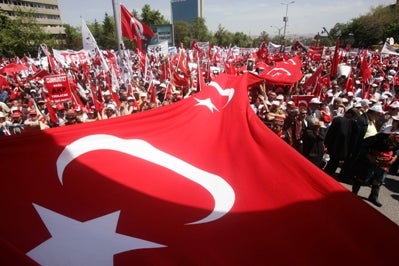Turkish Survey Results Support Heritage Findings
Baker Spring /
According to a March 29 article in the Journal of Turkish Weekly, 54 percent of Turkish survey respondents favor Turkey developing its own nuclear weapons in response to an Iranian nuclear threat.
The alternative provided to the respondents was for Turkey to rely on NATO’s security umbrella. Just 8 percent of the respondents favor the latter option. The survey was conducted by the Centre for Economic and Foreign Policy Studies.
This survey’s results bolster a key conclusion in a 2010 report released by The Heritage Foundation. It followed the conduct of an exercise that examines the arms race and arms control dynamic in a setting that resembles the greater Middle East following the proliferation of nuclear weapons. This conclusion was that the Obama Administration’s policies for nuclear arms control and disarmament and limited defensive capabilities is inadvertently serving to undermine the NATO security umbrella and increase the appetite for nuclear weapons in the region.
In the course of this iteration of the exercise, which was designed to mimic Obama Administration policies, the regional states—including both allies and adversaries of the U.S.—came to see U.S. security commitments as decreasingly credible. Regional states under the exercise opted to become more reliant on nuclear weapons to fill the security void resulting from U.S. arms control and disarmament policies that are similar to current ones of the Obama Administration.
A second finding in the Heritage study was that these same regional states adopted increasingly risky behavior in their attempts to fill the void. The result was that, in this iteration of the exercise, a nuclear conflict was the result of the risky behavior. Specifically, the Turkey-equivalent player in the exercise sought to keep the Israeli-equivalent and Iranian-equivalent players on the edge of conflict in order to force the U.S.-equivalent player to bolster his security commitments in the region. Ultimately, the Turkish-equivalent player lost control of this policy, and a nuclear conflict ensued.

